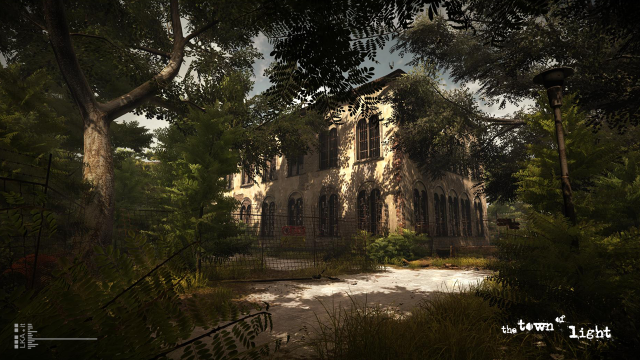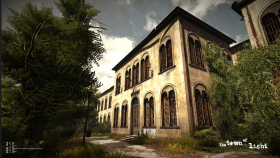
The Town of Light Review
DiCaprio won an Oscar, apparently, and coinciding with the release of this game, it gives me a perfect excuse to talk about one of my favourite films by good ol’ Leo — Shutter Island. Scorsese’s film uses the what-is-reality trope within a context that tries to emulate the protagonist’s feelings. Hallucinations, alternative personalities, self-tailored narratives and anxiety episodes are the basis of this film, and the way the viewer is made feel throughout is intended to empathise with those suffering from mental diseases. Mid-20th century psychiatry is deliberately a topic of much controversy, particularly given the development of this field in the late part of the century, which humanised and normalised mental issues. The Town of Light reiterates the idea that we’re barely in control of our brain, and that our perception of reality can be greatly distorted.
I explained most of the core premise of this game in my preview, which I recommend you take a look at for a more detailed account of the context in which this game is set. You’re Renee, a girl who has struggled with mental illnesses since childhood, and who was confined in a psychiatric hospital in her teens. This Italian institution was infamous and shut down due to cruel practices later on, but during the ‘40s it became one of the most important centres of psychiatric treatment. In the game, Renee is much older, and she trespasses into the abandoned hospital in order to relive and remember key parts of her past. As an urban explorer, the player is able to revel at the bucolic sights of an abandoned villa in the Italian countryside, but also witness the traumatic and painful discoveries of old-school psychiatric methods and in Renee’s past. And whereas Renee’s story makes you feel confused, stressed and paranoid, just like Shutter Island did, the gameplay and the exposition of the story are quite lethargic, and will often be too slow.
 This is a first-person game that attempts to use the visual and aural shock of its design as one of the main drives of its themes. Graphics have been carefully polished, and the lights and shadows merge perfectly in a mix of apricot oranges and greens, that can both convey the tranquillity of a Mediterranean locale and the rustiness of an abandoned psychiatric hospital at the same time. However, as beautiful and enticing as this landscape is, there’s a limit to how engaging a game is due its visuals. Renee’s walk speed is slow to an excessive degree, and she can’t even run, so going through the building is a whole chore in itself. Walking back and forth in the hospital is the basis of the gameplay, and picking up objects and reading notes every now and then doesn’t particularly spice up the game. The objectives are often unclear, which meant that I found myself travelling for minutes to one end of the map, only to realise that there was nothing to do in that wing of the hospital.
This is a first-person game that attempts to use the visual and aural shock of its design as one of the main drives of its themes. Graphics have been carefully polished, and the lights and shadows merge perfectly in a mix of apricot oranges and greens, that can both convey the tranquillity of a Mediterranean locale and the rustiness of an abandoned psychiatric hospital at the same time. However, as beautiful and enticing as this landscape is, there’s a limit to how engaging a game is due its visuals. Renee’s walk speed is slow to an excessive degree, and she can’t even run, so going through the building is a whole chore in itself. Walking back and forth in the hospital is the basis of the gameplay, and picking up objects and reading notes every now and then doesn’t particularly spice up the game. The objectives are often unclear, which meant that I found myself travelling for minutes to one end of the map, only to realise that there was nothing to do in that wing of the hospital.
This stagnant gameplay is coupled with Renee’s unapologetically allegorical soliloquies. Renee explains her story as you visit different parts of the hospital, and she tends to use very suggestive imagery and words. Sensorial descriptions will often come up, like ‘warm’, ‘filthy’ or ‘dark’, prompting the player to be guided by what these feelings convey. This does not redeem the fact that Renee’s poetic prose can be extenuating. Whereas I understand that the game’s trying to be vague and focused on the emotions triggered by semantics, Renee’s monologues are never interesting enough to be engaging. You feel like the diary of a frustrated emo teen, with so many metaphors about emotions and sensations that it feels more like a whiny little brat than somebody struggling with abuse, loneliness and schizophrenia. Its lack of self-awareness and the drivelling narrative just becomes obfuscating, taking an existential discourse into the childish.
 As I mentioned in my preview, this game acknowledges the experiences and stories of the people that were neglected and mistreated by society due to them having mental illnesses. It gradually shifts from the story to one of the many people that were rejected and tossed into psychiatrics, to one that explores the legitimacy of the methods carried out. Clinical psychiatry has always been an area of different shades of grey, in which interventions like lobotomies proved useful at times. There is a very grey morality that this game explores by letting you talk to Renee and help her create her outlook on her own story. From very personal matters it progressively starts questioning psychiatric methods and who’s responsible the suffering of the inmates.
As I mentioned in my preview, this game acknowledges the experiences and stories of the people that were neglected and mistreated by society due to them having mental illnesses. It gradually shifts from the story to one of the many people that were rejected and tossed into psychiatrics, to one that explores the legitimacy of the methods carried out. Clinical psychiatry has always been an area of different shades of grey, in which interventions like lobotomies proved useful at times. There is a very grey morality that this game explores by letting you talk to Renee and help her create her outlook on her own story. From very personal matters it progressively starts questioning psychiatric methods and who’s responsible the suffering of the inmates.
It’s the same problem again, though. The exposition is slow, constraining and exhausting. The ideas brought up by this game are ambitious, and in many regards, they involved the player in how they are developed. It’s a pity that in order to do this, the player has to withstand long-winded monologues and sleep-inducing lethargy. The gorgeous vistas can’t make up for the lack of direction in the game, and whereas the game brings up different interesting points for discussion, its value as a piece of game design is negligible. If you’re interested in psychiatry, this is a commendable game, but more due to its commentary than its gameplay.
The Town of Light (Reviewed on Windows)
The game is average, with an even mix of positives and negatives.
Even though the game touches upon very insightful ideas with a very critical eye, it's not engaging enough to actually make you have fun. The gorgeous landscape and the abandoned hospital are great settings, but this game's ambitions are too serious, and it often doesn't come across as such.











COMMENTS